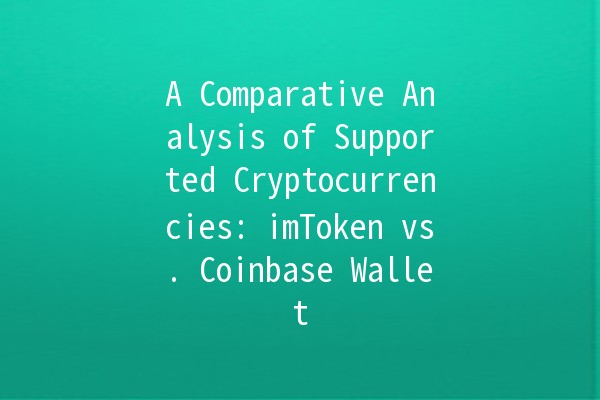In today's rapidly evolving digital landscape, cryptocurrency wallets serve as vital tools for users looking to store, manage, and transact their digital assets. With the rise of various cryptocurrencies, selecting the right wallet has become more crucial than ever. This article provides a comprehensive comparison of the supported cryptocurrencies in two popular wallets—imToken and Coinbase Wallet—offering insights for users who seek to optimize their crypto management strategies.
imToken is a multichain wallet that supports a wide range of cryptocurrencies, making it a popular choice among users who prefer versatility. Founded in 2016, imToken has received significant recognition in the cryptocurrency community for its robust security features and userfriendly interface. The wallet is designed to cater to users who hold various digital assets and engage in decentralized finance (DeFi).
Coinbase Wallet, a subsidiary of the wellknown cryptocurrency exchange Coinbase, also provides a multicryptocurrency storage solution. This wallet is distinct from the Coinbase exchange platform, allowing users to manage their private keys independently. Launched in 2018, it offers seamless integration with the Coinbase exchange, making it ideal for users already invested in Coinbase's ecosystem.
When assessing the supported cryptocurrencies in imToken and Coinbase Wallet, several factors must be considered, including the number of supported assets, the variety of networks (blockchains), and the ease of transaction or conversion.

imToken boasts support for over 1,000 different cryptocurrencies across multiple blockchains, including:
Coinbase Wallet supports a slightly more limited range of cryptocurrencies but remains competitive with its offerings, which include:
While both wallets support major cryptocurrencies like Bitcoin and Ethereum, imToken excels in the quantity of assets it caters to, supporting over 1,000 cryptocurrencies compared to Coinbase Wallet's more streamlined selection.
Both wallets are designed to provide a userfriendly experience, but their interfaces differ.
imToken presents a simple and intuitive interface that allows users to navigate seamlessly through various options. The layout emphasizes ease of access, facilitating quick transactions and management of assets. Users can easily explore DeFi applications and engage in token swaps, thanks to builtin functionalities.
Coinbase Wallet's interface is similarly userfriendly, particularly for those already familiar with the Coinbase ecosystem. The design emphasizes security, with a clear focus on private key management. Users can transition from the exchange to the wallet effortlessly, enhancing the overall experience.
Security is paramount when it comes to cryptocurrency wallets, and both imToken and Coinbase Wallet take measures to protect user assets.
imToken employs several layers of security, including:
Coinbase Wallet also prioritizes security, utilizing:
To assist users in optimizing their cryptocurrency management experience, we suggest the following productivityenhancing techniques:
To streamline asset management, categorize your cryptocurrencies by type or purpose. For instance, separate longterm holdings from those designated for trading. This organization helps in quickly locating assets and tracking performance.
Employ cryptocurrency trackers and portfolio management applications to monitor the performance of your assets in realtime. These tools provide valuable insights and help you stay informed of market conditions.
Configure price alerts for your significant assets within the wallet or through thirdparty applications. Receiving notifications when prices hit defined thresholds enables timely decisionmaking.
Leverage the capabilities of both imToken and Coinbase Wallet to engage with decentralized finance (DeFi) protocols. Participate in yield farming or staking opportunities to maximize the use of your assets, potentially generating additional income.
Take the time to assess and update your wallet's security settings regularly. Enable features such as biometric authentication and 2FA to ensure a robust defense against potential threats.
Choosing between imToken and Coinbase Wallet depends on your specific needs. If you prioritize a wider range of supported cryptocurrencies, imToken is a better option. However, if you prefer the integration with the Coinbase exchange and intuitive security features, Coinbase Wallet may be more suitable.
Yes! Both wallets enable users to swap or exchange cryptocurrencies directly within the platform, enhancing convenience.
Both wallets provide recovery phrases during setup. Ensure to store these phrases securely, as they can restore access if you forget your credentials or lose your device.
Each wallet may impose network fees for transactions on supported blockchains. Be sure to check the details before proceeding with any transaction.
Yes! Both imToken and Coinbase Wallet provide users access to various DeFi protocols, enabling staking, lending, and other opportunities to utilize your assets for profit.
Both imToken and Coinbase Wallet offer customer support through their respective channels, including FAQs, forums, and online chat. However, response times may vary based on user volume.
In the everchanging landscape of cryptocurrencies, imToken and Coinbase Wallet stand out as two formidable options for users seeking secure and versatile wallet solutions. While imToken boasts a significantly broader range of supported assets, Coinbase Wallet shines in its seamless integration within the Coinbase ecosystem. Users are encouraged to choose based on their unique interests, priorities, and overall goals in cryptocurrency management. By employing the productivity techniques discussed and leveraging the strengths of each wallet, users can effectively navigate the digital crypto space.